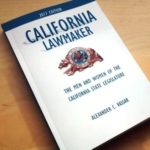Brian Dahle won last Tuesday’s special election in SD-01, and was sworn in eight days later. What I thought was interesting was that with the southern part of the district reporting vote totals earlier, Kevin Kiley led in the returns until over a third of the votes had been cast. The timeline is listed below. […]
Senator Delgado Arrives
Due in large part to an curiously timed Senate special election that resulted in Vanessa Delgado winning her special election (but not the primary for the new term beginning November 30th), Senator Delgado has been sworn in to an unusually short term in office. It’s worth noting that this election almost didn’t happen. If Senator Mendoza had […]
A Title Lost: California’s Legislative Historian
Associate Governmental Program Analyst. Agricultural Technician III. Data Processing Manager. Most job titles in California State Government are formulaic series of words that, while useful in understanding the duties of the position, are so wickedly unimaginative that you have to wonder if they were created by a committee. Yes, in fact, they were. But sometimes, […]
- 1
- 2
- 3
- …
- 17
- Next Page »
